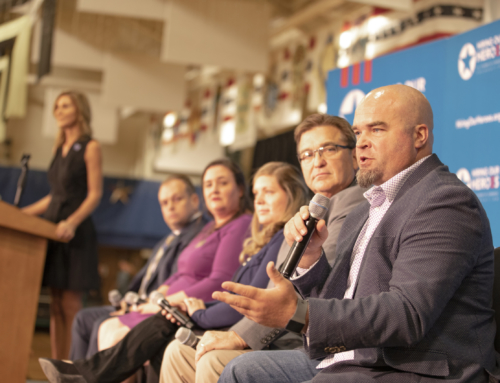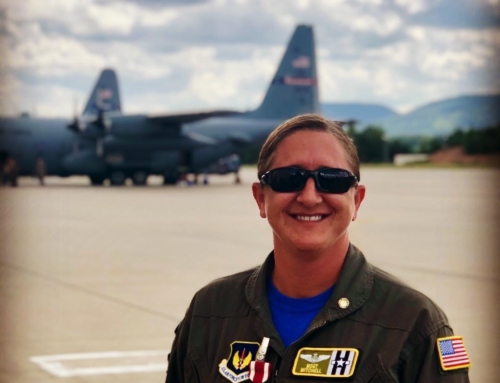The first thing Janine Smith will tell you if you’re a transitioning service member or military spouse considering a move to Wisconsin is the enthusiasm the state has for you. As co-chair of Wisconsin’s Military Spouse Economic Empowerment Zone (MSEEZ), building that enthusiasm is part of her job.
As part of the Hiring our Heroes initiative, Empowerment Zones work with public and private sector partners to identify career opportunities for military spouses, while also helping spouses combat the barriers they face. There are currently 16 Empowerment Zones around the country—15 of them are cities. Wisconsin is the only state-wide zone, and the only one with an emphasis on spouses of Guard and Reserve members.
“If you are coming to Wisconsin to look for a job, know that you’re not just looking near Fort McCoy, in Madison or in Green Bay. You can look at the entire state and find employers that want to work with you and can provide what you’re looking for,” Smith says. “Wisconsin is really behind being an Empowerment Zone.”
Smith moved to Wisconsin last September with her husband, a U.S. Army warrant officer. She’d been to Wisconsin several times before in her previous role leading employment workshops through working with an organization with a contract from the Department of Labor. When Wisconsin showed up on the list of possible assignments for her husband, they took it, and are glad they did.

“I tell people, you’ve got to get outside here. We have so many nice state and national parks. If you kayak, if you canoe, get on the water,” she says. “Experience the culture. We moved here in September, but in the short time we’ve been here, we’ve gone to a cranberry festival, we’ve walked around downtown La Crosse, my husband’s gone fishing and ice fishing. He is a motorcycle rider, and the roads out here take you through some really pretty parts of the state.”
Empowering military spouses
When she’s not connecting with Wisconsin’s outdoors, she’s connecting with military spouses.
If someone is looking for help with education or certifications, she often points them to Military OneSource resources like Spouse Education and Career Opportunities (SECO) or My Career Advancement Accounts (MyCAA) for financial assistance. If they’re struggling with their job search, she’ll connect them with the Wisconsin Economic Development Corporation’s Mission Wisconsin team for resume, interview and/or job search help, all free of charge to veterans, service members and their spouses.
April 1-2, Smith will be hosting a job fair with the Mission Wisconsin team at Fort McCoy. MSEEZ will have an information table, and she will be conducting resume workshops.
“Being able to plug people into the right area so they don’t feel like they’re going to hit a stumbling block is what I like to do. I think advocating above all for what’s in your best interest is a good way to start. What are you looking for? How can I help you reach your goal and what do you need to be successful?” she says.
Military spouses are often hesitant about how to approach employers, especially with a spotty work history, so Smith tells them to focus on their skills. Just because you’re no longer in the position doesn’t mean you’ve lost the skills you learned.
“If someone asks about the skills you’d bring to their organization, they’re not necessarily going to ask you where you got those skills,” she explains. “I want an employer to get to know who I am as a person first. We don’t all walk around wearing ‘military spouse’ tags. That’s just a part of us.”
If they do ask, she says to be proud of those skills and where you’ve honed them, even if it’s from running a household or working at the base thrift shop.
“Those are customer service skills, leadership skills, money management skills. Military spouses have all of those skills, not to mention the ability to delegate and schedule, to prioritize and organize.”
Advocating with employers
Smith’s number one piece of hiring advice for employers is to pick up the phone.
“When you notice the word ‘military’ or something that suggests a military background, call them instead of putting that resume to the side. I guarantee you’ll get a better sense of who they are than on that piece of paper,” she says.
“Call them because what you’re going to find out about a military spouse is that he or she is able to put things in a different perspective. If you offer them a job, they’re going to do the absolute best they can at that job. They’re going to come to work every day with a fantastic attitude and a great work ethic. That’s just the way they are.”
If an employer is hesitant about hiring someone who may only be around for a few years, she reminds them that it’s become rare for any employee to stay in the same position for 10 to 20 years. She points out that many military spouses have advanced degrees and encourages employers to put them in a position that values their skills, education and experience.
“Don’t discount their ability to move and grow within your company. There’s a lot I can do in two years.”
You can read more about Wisconsin’s designation as a Military Spouse Economic Empowerment Zone here.









FOLLOW US